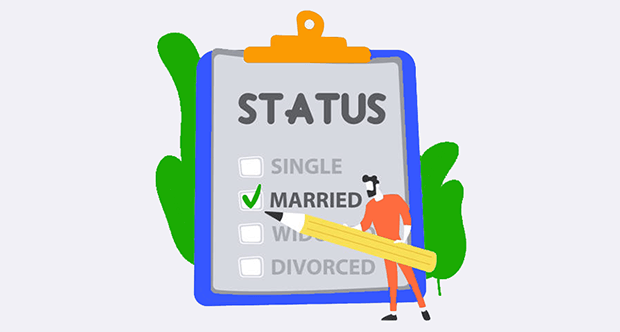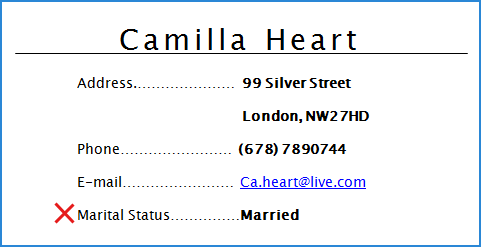 Sobhan Mohmand, Career Expert
Sobhan Mohmand, Career Expert  4 January 2023
4 January 2023

A common question we are often asked is,
“Do I need to include my marital status on my CV?”
The short answer is, no, you do not need to write your marital status or any other family-related information (e.g. number of children) on your CV.
It is irrelevant to your job application and it takes up precious space on your CV that could be utilised for more important information such as your education, experience and skills.
Too many candidates get too personal.
The employer does not need to know whether you’re single, married, divorced, remarried, engaged, with no children or a large tribe.
These details do not affect your ability to do the job so don’t clutter your CV with these irrelevant personal details.
A few decades ago, it was fashionable for people to include their marital status on their CVs. Some applicants used it as a status symbol whereas others included it because they thought it was mandatory to do so.
Since the beginning of the 21st century, however, this practice has gradually fallen out of fashion and it is now very rare to come across CVs with family-related data on them.

Sue Tumelty, a senior HR executive, writes in CV and Interview Handbook (pg.67): “There are some things that you should never put on a CV. It used to be the norm to include your age, marital status or nationality on a CV. Today such details are regarded as obsolete. Part of the reason behind this is that such information could be used to discriminate against you on grounds of gender, age or ethnicity. It also means that CVs are shorter and more punchy.”
With the introduction of a series of anti-discrimination and equality legislation, it has become illegal for employers to ask certain personal questions, including inquiring about family planning or asking whether the candidate is single, married or in a civil partnership.
Closing the door on prejudice and discrimination
Employers are normal human beings who may have some unconscious biases or prejudices that may affect their decision-making.
Not including your marital on your CV will allow them to judge your application on your experience, skills and abilities rather than on your personal family circumstances.
Consider the following marital statuses:
Words such as “divorced”, “separated” or “widowed” should never be used on a CV because they may arouse unfavourable and unjustified prejudices.
The employer is only interested in knowing whether you can do the job or not. Being single, divorced or happily married should have no impact on your ability to function well in your role.
Whether you should or shouldn’t include your marital status on your CV also sometimes depends on the country in which you live.
In most countries, including the UK, USA, Ireland, Australia and Sweden, applicants should not put any family-related information on their CVs.
In some other countries, such as Germany, Spain, Portugal and France, it is optional for applicants to include these types of personal information on their CVs.
Only in a handful of countries, such as Italy, applicants are expected to include their marital status on their CVs, in addition to other personal information such as place of birth, date of birth and nationality.

Candidates that include their marital status on their CVs usually want to capitalise on the common preconceptions that single people are more mobile and that married men are more dependable.
When being single could be an advantage
A single person is perceived to be a person who is free of personal responsibility, more mobile and can commit themselves fully to the job.
The types of jobs for which being single could be an advantage include jobs that involve a lot of travelling, have unsocial working hours and inconsistent and/or long shifts.
When being married could be an advantage
Typically, a married person is considered to be someone who is settled down, dependable and reliable, lives in a stable environment and has a personal responsibility to provide for his/her family.
These traits are highly desired by employers because they are usually interested in hiring candidates on a long-term, permanent basis.
Do these stereotypes still apply today?
It could be argued that the above-mentioned generalisations no longer apply in this day and age. A single person can be as reliable and stable as a married person, so the marital status is no longer relevant.
Furthermore, a lot of things can be ‘read’ into your personal family circumstances, which may or may not be to your advantage, depending on the attitude of the reader.
For example, there was an applicant who had written on their CV:
This would indicate stability, right?
However, the home address of the applicant was far away from the job location so the family would need to relocate if the candidate was hired for the job. The employer was put off by the prospect of this candidate relocating his family, settling in a new area and meeting the costs of relocation.
In this scenario, the applicant’s address and “married, 3 children” worked against them and they were not shortlisted for an interview.
Some CVs include the ages, sexes and even the names of the applicant’s children. Leave these out. They are irrelevant to your ability to do a job, and a prime source of prejudice, particularly if you are female.
A standard CV must contain the following personal details:
These personal details are important because employers can use them to contact you.
The following are personal details that should not be included on a CV:
There is no requirement to include your marital status, number of children or other family-related information on your CV. These kinds of personal data open the doors of discrimination against you, clutter your CV with irrelevant information and distract the employer’s attention from more important details such as your educational background, work experience and skills.
Good luck with your job hunt!